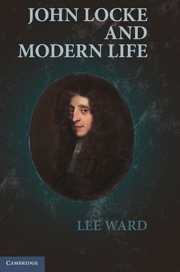1 - The Democratization of Mind
Published online by Cambridge University Press: 05 July 2011
Summary
It may seem odd to begin a study of Locke's modern politics by turning to his most philosophic work, the Essay Concerning Human Understanding. Indeed, it was once quite common among Locke scholars to express serious doubts as to whether the Essay and Locke's political writings such as the Two Treatises are even compatible with the latter advancing a political theory based on natural law, natural rights, and property, and the former propounding an empiricist epistemology with little to say about rights and displaying a skeptical attitude toward any normative claims derived from nature. While Locke's epistemological and political writings certainly reflect different kinds of books with discrete particular aims, it is important to understand their fundamental connection. At their deepest level, all of Locke's mature writings, whether political, philosophical, moral, or theological, reflect his consuming preoccupation with examining and defending human freedom in its various aspects.
The aspect of human freedom Locke illuminated and developed in the Essay involved his treatment of the intellectual foundations of modernity. This philosophic account of intellectual freedom was a feature of a novel conception of the rational faculties, which we will term the democratization of mind. It was in the context of his articulation of a new philosophy of mind that Locke addressed such politically salient questions as: What does it mean to be a free moral agent and how does an individual mind come to know anything in particular, much less the general form and substance of a natural law governing human relations?
Information
- Type
- Chapter
- Information
- John Locke and Modern Life , pp. 17 - 64Publisher: Cambridge University PressPrint publication year: 2010
